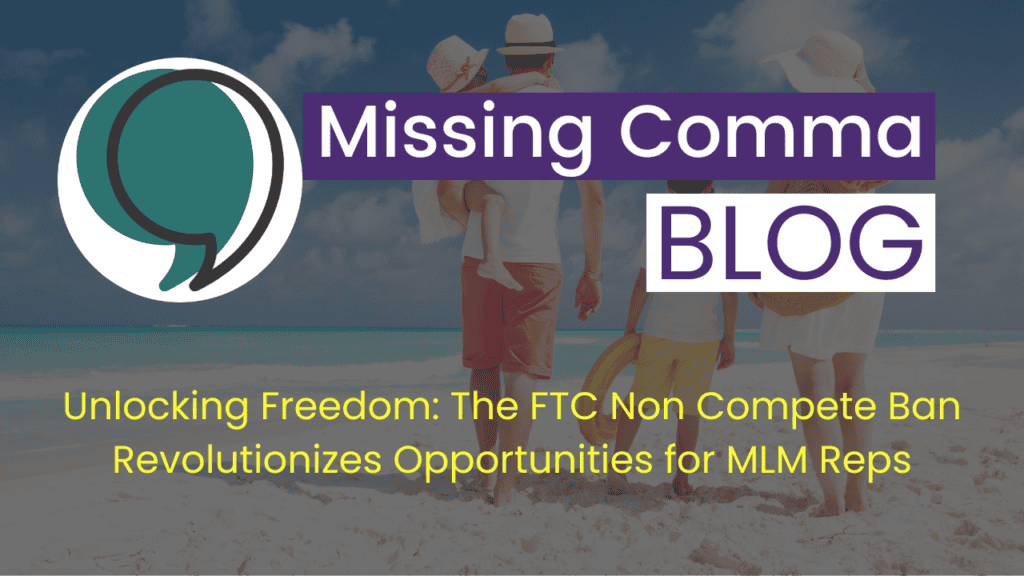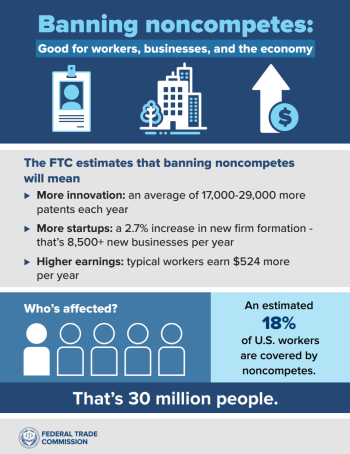My content may contain 3rd party affiliate links for products I use and love. If you take action (i.e. subscribe or purchase) after clicking one of these links, I'll earn some coffee money ☕ which I promise to drink while creating more helpful content.
[lwptoc]
Introduction
There has been a lot of talk around the web about the FTC non compete ban. In case you missed it, on April 23, 2024, the Federal Trade Commission (FTC) issued a ruling about banning non-compete clauses. Since many MLM/ Network Marketing companies use a non-compete in their Distributor Agreements, this could change the landscape for us as independent sales reps in the multi-level marketing (MLM) and network marketing industry. So, let’s take a look.
Disclosure/Disclaimer: Please note that I am not an attorney, nor am I providing legal advice. I’m just a monkey banging on a keyboard. The information presented here is for educational and informational purposes only. For specific legal advice, it is always best to consult with a qualified legal professional.
On April 23, 2024, the FTC finalized a rule banning non-compete clauses for most workers, effective
September 4, 2024. This new rule prohibits employers frome nforcing or creating new non-compete agreements, with only a few limited exceptions. For independent contractors like us, this ruling will bring about substantial changes, providing us with greater freedom and mobility.
As an independent MLM sales rep, you might be wondering how this affects you. I know I was. This article aims to break down the FTC's new rule, its implications for independent contractors, and what it means for the future of our MLM businesses. We'll look at how this change impacts us as MLM reps and what adjustments our various companies might need to make.
Understanding the FTC Non Compete Ban
The FTC's new ruling on non-compete clauses is a game-changer for workers across various industries, including MLM and network marketing. Let’s break down what this rule entails and what it means for you as an independent sales representative.
Comprehensive Ban on Non-Competes
On April 23, 2024, the FTC voted to finalize a rule that broadly bans non-compete agreements for most workers. This rule will take effect on September 4, 2024, and aims to eliminate barriers that prevent workers from freely moving between jobs or starting their own businesses. The ban is extensive, covering all workers, including employees, independent contractors, interns, and volunteers. (Goodwin) (McGlinchey Stafford PLLC)
Scope and Effective Date
The rule applies to all non-compete agreements entered into after the effective date of September 4, 2024. For existing non-compete agreements, employers must notify workers that these clauses are no longer enforceable. This requirement is critical for ensuring that workers understand their new rights and freedoms under the rule. (Faegre Drinker Biddle & Reath LLP) (McGlinchey Stafford PLLC)
Key Definitions
Worker: The rule defines "worker" broadly to include any individual working, whether paid or unpaid. This includes independent contractors, which means that MLM independent sales reps are covered under this rule.
Non-Compete Clause: A non-compete clause is any contractual term between an employer and a worker that restricts the worker's ability to work for a competitor or start a competing business after the end of their employment. (Goodwin) (Davis Wright Tremaine)
Exceptions and Limitations
While the rule is comprehensive, it does include some exceptions:
Senior Executives: Non-compete clauses for senior executives, defined as those earning more than $151,164 annually and holding a policy-making position, may remain in force if they were entered into before the rule's effective date. However, this doesn't include us. Even those of us who exceed the income threshold, becaue we aren't in policy-making positions. (Goodwin) (McGlinchey Stafford PLLC)
Bona Fide Sale of a Business: Non-compete clauses related to the sale of a business can still be enforced if they are part of a bona fide sale. This exception doesn't apply to most of us because we usually don't have significant ownership stakes in the company. (Faegre Drinker Biddle & Reath LLP) (Davis Wright Tremaine)
Retroactive Application and Notice Requirement
The rule applies retroactively, meaning that existing non-compete agreements (except for those with senior executives) will no longer be enforceable after the effective date. Employers are required to notify affected workers, both current and former, that their non-compete agreements are void. The FTC has provided model language to help employers comply with this notice requirement. (Davis Wright Tremaine)
Broader Impact on Restrictive Clauses
The rule's broad language may also affect other restrictive covenants, such as non-solicitation and no-hire agreements, if they function to prevent future employment. This means MLM companies need to review all related agreements to ensure compliance (Davis Wright Tremaine).
In conclusion, the FTC's new rule on non-compete clauses is designed to enhance worker mobility and promote fair competition. For independent sales reps in MLM, this means greater freedom to pursue new opportunities without the legal constraints of non-compete agreements.
Key Provisions of the FTC Non Compete Ban

Image by Markus Winkler from Pixabay
So that we can get a good handle on how the FTC non compete ban impacts us as independent MLM reps, let's take a look at the key provisions of this regulation. We'll look at the main components of the rule and how they apply to workers and employers.
Comprehensive Ban on New Non-Competes
The FTC's rule establishes a blanket ban on new non-compete agreements for almost all workers. This prohibition means that from September 4, 2024, employers can't enter into non-compete agreements with their workers, which include employees, independent contractors, interns, volunteers, and any other individuals working under various forms of engagement. (Faegre Drinker Biddle & Reath LLP) (McGlinchey Stafford PLLC)
Scope and Effective Date
Effective Date: The rule takes effect on September 4, 2024, giving employers a 120-day period from the rule's publication date to comply.
Scope: The ban applies to all new non-compete clauses entered into after this date, regardless of the worker's status or the industry they are in.
Treatment of Existing Non-Competes
The rule doesn't just prevent future non-competes; it also nullifies most existing non-compete agreements. Here’s how it handles these agreements:
Void Existing Non-Competes: For the vast majority of workers, including we MLM reps, existing non-compete agreements will become unenforceable as of September 4, 2024. This means that MLM companies will no longer be able to restrict their independent sales representatives from joining competitors based on prior non-compete clauses. (Goodwin) (McGlinchey Stafford PLLC)
Notification Requirement: Employers (and those utilizing 1099 independent contractors) are required to inform all affected workers, including former employees and independent contractors, that their non-compete clauses are no longer valid. This notification must be given by the effective date using model language provided by the FTC. (Davis Wright Tremaine)
Exceptions and Limitations
While the rule is extensive, it does provide a few exceptions to the blanket ban. These exceptions won't apply to the vast majority of network marketing sales reps. They're primarily dorected at owners and senior members of the corporate management team.
Senior Executives
Definition: Non-compete clauses for senior executives, defined as those earning more than $151,164 annually and holding policy-making positions, can remain enforceable if they were established before the rule’s effective date. This exception is very narrow, covering less than 1% of the workforce. (Goodwin) (Davis Wright Tremaine)
Criteria: To qualify, the executive must have substantial decision-making authority, such as a CEO or a president of a business entity. (Goodwin)
Bona Fide Sale of a Business
Sale Context: The rule permits non-compete agreements related to the sale of a business entity. This exception applies if the non-compete is part of a bona fide sale, meaning it’s negotiated at arm’s length and is reasonable under the circumstances. (Faegre Drinker Biddle & Reath LLP) (Davis Wright Tremaine)
Removal of Ownership Threshold: The final rule does not include the proposed rule’s 25% ownership threshold for this exception, meaning any business owner selling their stake could potentially have a non-compete enforced. (Goodwin)
Impact on Related Agreements
The rule’s broad scope could impact other types of restrictive agreements if they might function to prevent future employment. This includes:
Non-Solicitation and No-Hire Agreements
The rule could render certain non-solicitation and no-hire agreements unenforceable if they

Image by Steve Buissinne from Pixabay
effectively act as non-compete clauses by preventing future employment opportunities. For MLM companies, this could mean that policies designed to prevent cross-recruiting, where reps are prohibited from recruiting members of other teams within the same MLM company, might be scrutinized. If these policies significantly restrict a representative's ability to recruit or build their own team elsewhere, they could be seen as de facto non-compete agreements. (Davis Wright Tremaine)
Non-Disclosure Agreements (NDAs)
NDAs and other agreements that protect trade secrets and confidential information are not banned, provided they do not overly restrict the worker's future employment options. This ensures companies can still protect their proprietary information without violating the rule. A question to be answered about this is whose proprietary information an MLM leader's downline contact information is. Does the company own the list or does the rep? (McGlinchey Stafford PLLC) (Davis Wright Tremaine)
In short, the FTC's non-compete ban represents a significant shift in employment law, aiming to increase worker mobility and promote fair competition. Understanding this rule will help MLM independent sales representatives and companies continue to work under the regulatory regime. Going forward, we'll want to stay informed about these and other changes so we make informed decisions about our MLM business.
Specific Impact on Independent Sales Reps in MLM
So, how does the FTC's non compete ban specifically impact independent sales representatives in MLM and network marketing?
How the Rule Applies to Independent Contractors
The FTC's rule explicitly includes independent contractors within its definition of "worker." This means that independent sales representatives in MLM companies are directly affected by the ban on non-compete clauses. Here’s how:
Inclusion of Independent Sales Reps: By defining workers broadly, the FTC ensures that independent contractors, including MLM sales reps, can't be subject to new non-compete agreements after September 4, 2024. This inclusion protects we independent MLM reps from restrictive covenants that could limit our career mobility.(Goodwin) (Davis Wright Tremaine)
Ban on Future Non-Competes: For independent sales representatives, the prohibition on new non-compete agreements means greater freedom and flexibility in our careers. This change allows MLM reps to explore new opportunities. Without the constraints of non-compete clauses, we can join other MLM companies or start our own ventures without fearing legal repercussions from our companies. (Faegre Drinker Biddle & Reath LLP) (McGlinchey Stafford PLLC)
Nullification of Existing Non-Competes: The FTC's rule also affects existing non-compete agreements, which will become unenforceable for most of us. For MLM companies and their sales representatives, this means existing non-compete clauses will be nullified, and MLM companies will have to notify all affected sales reps by the effective date.
This is a good thing for us but it's a two-edged sword. This all could lead to a surge in turnover as folks in our downlines s take advantage of their newfound freedom to seek other opportunities. It will be up to us and our companies to make sure our teams have strong incentives to stay with us.
Potential Impact on Non-Solicitation Clauses
The rule's broad language could impact other restrictive agreements if they effectively act as non-compete clauses. This has specific implications for MLM companies that employ Non-Solicitation agreements. The rule could make non-solicitation agreements unenforceable if they prevent future opportunities. For MLM companies, policies designed to prevent cross-recruiting might be scrutinized. If these policies significantly restrict a representative's ability to build their own team elsewhere, they could be seen as de facto non-compete agreements. (Davis Wright Tremaine)
To summarize, FTC's new rule on non-compete clauses significantly impacts independent sales reps in MLM, providing us with greater career mobility and freedom. But again, this applies to everyone in our downlines, as well. By understanding these changes and how they apply, we as MLM sales reps can navigate the new landscape effectively and make informed decisions about their futures.
Benefits for Independent MLM Sales Reps
The FTC's new rule on non-compete clauses brings several significant benefits for us as independent sales representatives in MLM. Most notably, it gives us the freedom to pursue new opportunities without being terminated by our present company. Without the constraints of non-compete agreements, we can easily switch between companies, operate compatible offers or even start our own businesses. This flexibility allows us to seek out better opportunities and leverage our skills and networks more effectively.
In addition to increased mobility, the rule provides a more competitive and innovative environment within the MLM industry. With fewer restrictions, we're encouraged to explore new ideas, share best practices, and collaborate across different companies. This dynamic could lead to improved business strategies and greater success for each of us. Overall, the FTC's rule gives us more room to pursue our entrepreneurial goals and achieve greater financial success.

How MLM Companies Will Adapt
With the FTC's new rule banning non-compete clauses, MLM companies will need to make significant adjustments to how they operate. As independent sales reps, we'll experience these changes personally, and it's important to understand what companies might do to adapt.
Firstly, MLM companies will likely shift their focus from non-compete clauses to other types of agreements that protect their interests without restricting our career mobility. For instance, we might see an increase in the use of non-disclosure agreements (NDAs) and non-solicitation clauses. These agreements can help companies safeguard their proprietary information and client lists while still allowing us to move freely between different opportunities. I think the next battle for us as reps is the argument over whose list the geneaolgy really is.
Another likely change is that companies will need to improve their overall value proposition to retain top talent. Without non-compete clauses, companies can no longer rely on legal restrictions to keep us on board. Instead, they'll need to offer better incentives, such as higher commissions, more robust training programs, and better support systems. This shift could lead to a more competitive and supportive environment for us as sales reps, as companies vie to be the most attractive option for our skills and efforts.
Overall, while the FTC's new rule will require MLM companies to adapt, these changes could lead to a more dynamic and fair industry, benefiting us all in the long run.
Conclusion
The FTC's non compete ban marks a significant shift for independent sales reps and the MLM industry as a whole. By banning most non-compete agreements, the rule gives us greater freedom to pursue new opportunities without legal restrictions. This newfound flexibility will allow us to seek better opportunities and explore entrepreneurial ventures with confidence.
For MLM companies, this rule means revising existing contracts and finding new ways to retain top talent. While these changes may present challenges, they also open the door to a more competitive and innovative industry. Companies will need to enhance their value propositions and focus on creating supportive environments that attract and retain the best talent.
As we navigate this new era, staying informed about our rights and the evolving regulatory landscape is a big deal. By understanding the FTC's rule and how it affects us, we can make strategic decisions that enhance our careers and contribute to a more dynamic MLM industry.
We are better positioned than ever to take control of our careers, pursue our entrepreneurial goals, and achieve greater financial success. The future of MLM looks bright, and the possibilities are endless. Let’s embrace these changes and make the most of the opportunities ahead.
Call to Action
- Share this article with others in the MLM community to spread awareness about the new rule and its implications.
- Subscribe to our blog for updates on similar topics and to stay informed about important industry changes.
- If you have specific legal concerns, consider consulting with legal professionals specializing in employment law for personalized advice.
By staying proactive and informed, we can navigate these changes successfully and continue to thrive in the ever-evolving world of MLM.
Citations
1. Goodwin Law
[FTC Non-Compete Agreements: Final Rule Issued | Goodwin](https://www.goodwinlaw.com)
2. Faegre Drinker Biddle & Reath LLP
[Total Ban: FTC Issues Final Rule Banning Employment Noncompete Agreements | Publications | Insights | Faegre Drinker Biddle & Reath LLP](https://www.faegredrinker.com)
3. McGlinchey Stafford PLLC
[FTC Votes on Final Rule to Ban Non-Compete Agreements | McGlinchey Stafford PLLC](https://www.mcglinchey.com)
4. Davis Wright Tremaine
[UPDATE: FTC Publishes Final Rule Banning Non-Competes: A Simple Explanation | Davis Wright Tremaine](https://www.dwt.com)
These sources provided comprehensive insights into the FTC’s final rule on non-compete clauses and helped outline the implications for independent sales representatives in MLM.

